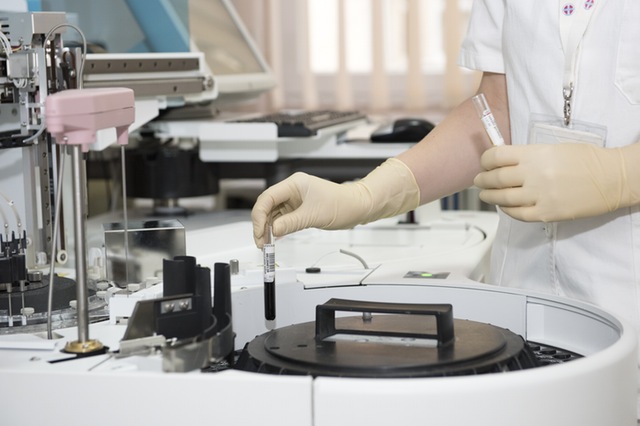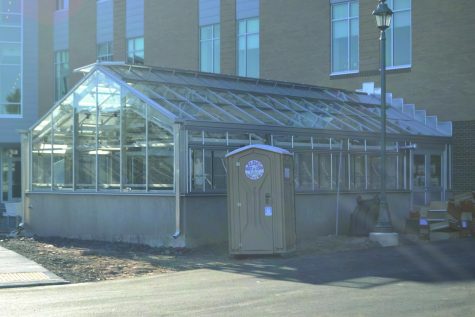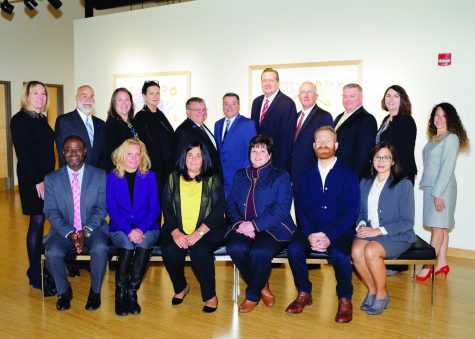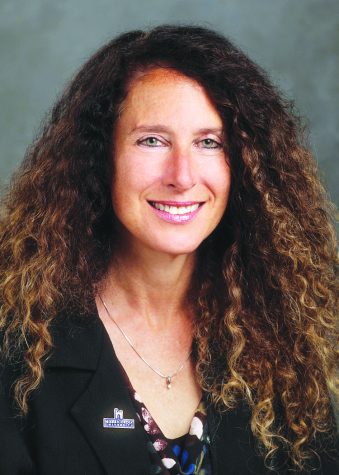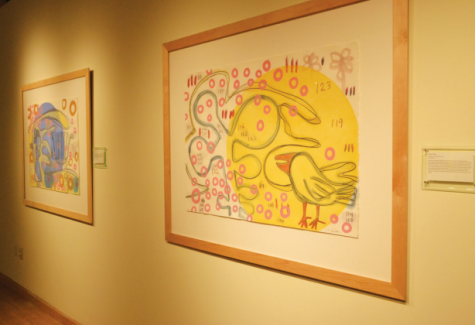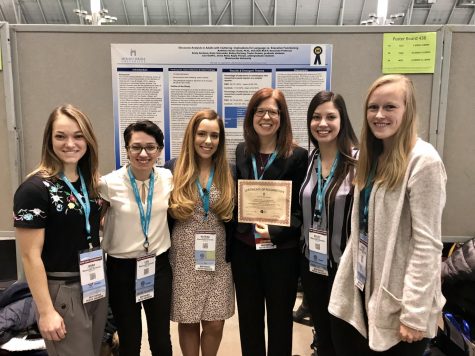‘Deadly Medicine’ Exhibit Presents Ethical Debates
February 9, 2017
The Deadly Medicine exhibition, which opened January 18 in the Pauly Friedman and MacDonald Art Gallery, is garnering big interest.
The exhibit is a labyrinthine structure that takes the visitor through the history of eugenics, and all the medical horrors that became of it. As with history, the exhibit culminates in the atrocities committed in concentration camps against victims of the Holocaust.
“It’s a traveling exhibition from the U.S. Holocaust Museum,” said Dr. Amanda Caleb, an English professor and one of the coordinators of the exhibit, who explained that it is designed for people who can’t make it to the Holocaust museum in Washington, D.C. “It’s gone all over the country, and there’s also a second version of it that’s in Israel right now that’s on kind of semi-permanent display. So when we found out that this existed and that we could put in an application, we jumped at the opportunity and applied for it last year for this year.”
The exhibit offers examples of the practice of eugenics, such as early posters promoting the idea of a stronger, healthier society, photographs of the victims, lists of various criteria that a “healthy” individual must meet, videos of propaganda, the concentration camps, and the survivors of the Holocaust.
“We trace the Holocaust and explore its relevance for modern society,” said Dr. Stacy Gallin, Founder and Director of the Maimonides Institute for Medicine, Ethics, and the Holocaust. “I think what people don’t realize is when people think about the Holocaust, they think about it as being a piece of history, but it’s much more than that.”
She said that the Holocaust, and particularly the medical aspects of it, have a tremendous amount of relevance for modern medical practice, scientific theory, health care policy, and human rights endeavors.
“The Maimonides Institute aims to offer educational programming that reaches across generations and religions and professions and countries, so that we can reach as broad an audience as possible,” Gallin said.
The Holocaust is a topic that many people might think they know well enough, but the exhibit proves that there is always more to learn.
“We have a responsibility to continue talking about it. We have a responsibility to those who lost their lives, and whose lives were changed irrevocably at the hands of Nazi medicine, and we have a responsibility to the future and to future generations to make sure that this does not happen again,” she said.
Gallin added that she likes that Misericordia is a Catholic university that has really embraced the idea of educating people about the Holocaust.
“It’s not a Jewish issue, it’s not a German issue, it’s a human issue, and it’s a global issue. The Maimonides Institute is happy to work both with Misericordia and also to work with the Deadly Medicine exhibit to try and put together educational programming to ensure the lessons of Nazi medicine are not forgotten.”
On its own, the exhibit is solemn but educational on the subject of how far humans are willing to go in the name of science. While it is by no means a pretty exhibition, it is a visceral experience that leaves a strong impact.
“I think it’s great,” said Ariel McPeek, a philosophy and medical health major. “I think it’s very important that especially college students our age, that they’re educated on what’s happened because I don’t think that eugenics or the Holocaust or any of this should go by unnoticed ever. I feel like there are a lot of people who tend to say, ‘well, it happened so long ago, like what’s the point?’ I feel like there’s definitely a point, a lot of stuff like medical information was produced through the Holocaust, and a lot of stuff has happened that still pertains to today like politics, the economy, and just the world in general. I think it’s very important that students learn, and continue to learn about it.”
Deadly Medicine is accompanied by a series of individual speakers who offer ‘ insight on the details and themes of the exhibit. These speakers include members of the faculty such as Rabbi Larry Kaplan, Dr. Okla Elliot and Dr. Margot Wielgus, among others.
Kaplan’s event called “Should Good Come Out of Evil?” was held January 19. Kaplan, a Rabbi at Temple Israel and a teacher of Bible, delivered a lecture that rationalized the debate of whether the information gathered in the experiments should be used.
Kaplan focused on both sides of the argument, explaining that the information gathered in the experiments is out there and is being used. Whether this “living data” stolen from the victims of the Holocaust should be used is up for debate. As for Kaplan’s own leanings on the issue, he admitted he can’t say.
“Both sides of the bio-ethical issue make sense,” said Kaplan. “From a spiritual perspective, the deaths of so many, of really a third of the Jews in the world and obviously so many others, and that as a Jew, a tiny percentage of the Jews left in the world, that it would be triple that today if Hitler wasn’t successful. So on one hand the memory of those that died should be allowed to rest in peace.”
Kaplan spoke more broadly about how society has gotten into the habit of comparing people to Nazis and Hitler without basis, which he finds upsetting as he feels it “cheapens the destruction and the deaths.” He believes that those who died should be remembered, and that by that logic he spiritually cannot condone the usage of the information.
“On the other hand, it could save lives,” said Kaplan. “The Talmud has this great line that is also in the Quran and it says if you’ve saved one life, it is as if you have saved an entire civilization. So I really don’t come down one side or the other.”
Students who attended the lecture were receptive to what Kaplan had to say on the morality of using information gathered through human experimentation by the Nazi doctors.
“I thought it was very insightful,” McPeek said. “I like how Rabbi Kaplan talked about the need to use that information. I think that a lot of the stuff that came out of the Holocaust, although it was very bad circumstances from which we found this information, I think it’s very important and it led to a lot of important decisions about health and medicine in general.”
The lecture series based around the Deadly Medicine exhibit aims to further educate visitors about the inhumane treatment of patients at the hands of Nazi doctors in the years leading up to and during the Holocaust.
Dr. Matthew Wynia and Dr. Patricia Heberer-Rice gave a lecture on January 26 called “How Healers Became Killers: Nazi Doctors and Modern Medical Ethics” in which they addressed the history of medical practitioners’ responsibility in the Holocaust.
The final lecture of the series is scheduled for Tuesday, March 14, when Eva Mozes Kor, a Holocaust survivor and victim of the infamous Mengele twins experiment, will speak about her experiences and her decision to choose forgiveness over hatred.

